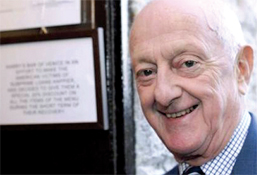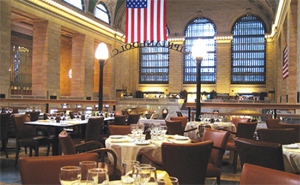

Giuseppe Cipriani, left, and his father, Arrigo Cipriani. Giuseppe said the company is still expanding globally.The Cipriani restaurant and real estate empire is not exactly a stranger to controversy in New York City, having weathered rival nightclub and restaurant moguls, years of acrimony with organized labor, and even the federal government.
But its latest battle with Capital One Bank over a $4 million judgment is prompting many in the industry to question the future of the Cipriani empire in New York.
“The banks want their debts paid,” said Dan Fasulo, managing director of research at Real Capital Analytics. “There’s a lot of different things a debtor can do to try and hold up the process, but eventually the bank’s going to try and get their money any way they can.”
Last month, the Ciprianis managed to temporarily stave off a full-on auction of everything from chandeliers to kitchen appliances at their high-profile Manhattan restaurants and event spaces: Harry Cipriani, Cipriani Downtown, Cipriani 42nd Street and Cipriani Dolci. But they’ve been through an especially tough few years with the downturn, with their most highly publicized blow the loss of their lease at the famed Rainbow Room.
Now, another even more serious judgment day is looming.
Lawyers for the Ciprianis are due back in court on Oct. 19 in the ongoing settlement talks with Capital One, and even if they succeed in quashing the auction altogether, the attorneys are still expected to hash out a hard-to-swallow settlement with the lender.
David Schechtman, senior director of the turnaround and distressed asset group at Eastern Consolidated, noted there is still time to resolve the Cipriani case amicably. “Generally when a 363 sale [a sale of assets in a bankruptcy case] is scheduled, you’ve hit the substance of a lawsuit,” said Schechtman. “You’re very far along, but everything can be unscrambled.”
Those familiar with the negotiations insist that Cipriani is indeed well on the way to resolving the dispute without the need for an auction.
“The auction is history,” said Stephen Meister, the attorney representing Cipriani in the Capital One case. “We’re paying them in cash and we’re not getting a discount.”
Meanwhile, sources noted that Cipriani posted a $3 million bond after the auction was halted to back up their outstanding Capital One debt, which indicates that Cipriani has the incentive to resolve the legal issues out of court. Sources said the remaining issues between the catering company and Capital One surround who will absorb the legal fees.
Harvey Strickon, a lawyer for Capital One, said, however: “If you want to stop the foreclosure sale, then pay.”
“If they didn’t have the money to pay us, how were they able to [post] a $3 million bond?” he added.
Giuseppe Cipriani — whose grandfather opened the now-legendary Harry’s Bar in Venice, Italy, the family’s home country in the 1930s, and who with his father, Arrigo, started Cipriani’s New York City expansion in 1985 — declined to discuss any of his company’s legal or financial issues. But in an interview last month, he seemed even-keeled about the family business, despite the latest round of controversy. He said the company is still expanding globally.
“In the rest of the world, the crash really wasn’t as bad as it was [in the U.S.],” he told The Real Deal from London in a telephone interview.
He pointed to a new restaurant that’s scheduled to open in Istanbul this month. The company — which has 10 restaurants worldwide, including five in New York — is also planning additional overseas expansion. Sources say it’s scheduled to manage 50,000 square feet of space at the Yas Yacht Club in Abu Dhabi, where Cipriani will have a branded restaurant and event space. In Moscow, it has plans for three restaurants, with a nightclub and catering space for up to 700 guests.
Plus, a 139-unit hotel called Cipriani Beverly Hills is scheduled to open in March or April.
Some observers note that while the Ciprianis have survived a host of troubles before, the economic downturn has had a particularly significant impact on their overall operations. In addition, the current fight with Capital One does come after a string of other high-profile blows.
In 2007, the Ciprianis agreed to pay $10 million in restitution to settle tax fraud charges. Giuseppe pleaded guilty to a misdemeanor, while his father pleaded to a felony tax evasion charge.
In 2008, the company paid $12 million to terminate the 20-year lease it signed in 2003 at the International Toy Center at 200 Fifth Avenue, ending a bitter dispute with the tower’s owners, L&L Holding Company.

Cipriani Dolci
And in 2009, the company lost the lease of their most famous location, at the Rainbow Room, after an ugly fight with landlord Tishman Speyer. Tishman had started eviction proceedings after the Ciprianis, stung by the recession, failed to pay several months of rent.
Cipriani attorney David Rozenholc noted that his client won an arbitration ruling in the Tishman dispute because the landlord tried to impose a massive rent increase.
“The landlord was trying to rip them off by charging $9 million,” Rozenholc told The Real Deal. “Look at what happened to the Rainbow Room now — it’s empty.”
On top of the legal woes, the Ciprianis have faced a number of other market challenges.
In 2005, the company teamed up with developer Steve Witkoff to convert the landmark Beaux Arts building at 55 Wall Street into condos, creating the luxury, fully furnished Cipriani Club Residences.
However, the location, while gentrifying, was not ready for the $1,500-a-square-foot prices the sponsors were trying to fetch. According to StreetEasy, 99 recorded sales there averaged $1,272 a square foot and there are currently 41 units listed for sale at $1,191 a square foot. The project, which the sponsors say is now 90 percent sold, went through several marketing teams, including those of real estate icon Louise Sunshine and Prudential Douglas Elliman.
Meanwhile, Cipriani ran into an even weaker environment in South Florida in 2008, when it announced plans for the Cipriani Ocean Club and Residences in South Beach. The project, a venture with the Patrinely Group and two Miami developers, featured a complete repositioning of the landmark Saxony Hotel, with 209 hotel suites and 65 luxury club residences. But despite announcing financing for the project, the group quietly halted construction. Sources say the residences are now scheduled for a 2012 opening.
But it seems that the company may have better prospects overseas. Much of the focus over the past two years has been on new restaurants and other venues in Europe, Asia, Latin America and the Middle East. In addition to the Istanbul, Moscow and Abu Dhabi ventures, Cipriani also has plans for a 100-unit hotel and event space in Sao Paulo.
On the New York front, observers say Cipriani’s struggles make sense given that the downturn had a big impact on corporate marketing and promotions, arguably the company’s biggest customer base. As one source put it: “People don’t make reservations for $200,000 parties when the economy tanks.”
The source, who asked not to be identified but is familiar with Cipriani’s operation, continued, “Like a lot of different businesses in this economy, they fell behind. … However, they have winning restaurants and a winning game plan.”
Nightclub and real estate broker Alex Picken said part of the appeal of Cipriani’s is its ability to find great locations with fantastic architecture and create a glamorous atmosphere. That sense of style has helped the Cipriani name become one of the most powerful event brands in New York, if not the country. The restaurant empire is still drawing big names, as evidenced last month, when the “Wall Street II” after-party was held at their 42nd Street site, attracting A-list names ranging from Tyra Banks to Susan Sarandon and Warren Buffett.
Also, while Giuseppe said the company is in a holding pattern in New York, Picken said the company is considering new locations. He declined to divulge any other details.
Robert Futterman, chairman of retail brokerage Robert K. Futterman & Associates, said despite Cipriani’s recent troubles, the brand will be a draw for commercial tenants when the economy recovers.
“If a restaurant space was available and a landlord wanted to attract a top brand, or wanted to lease office space to a hedge fund, having a name like Cipriani in the building is a plus.”